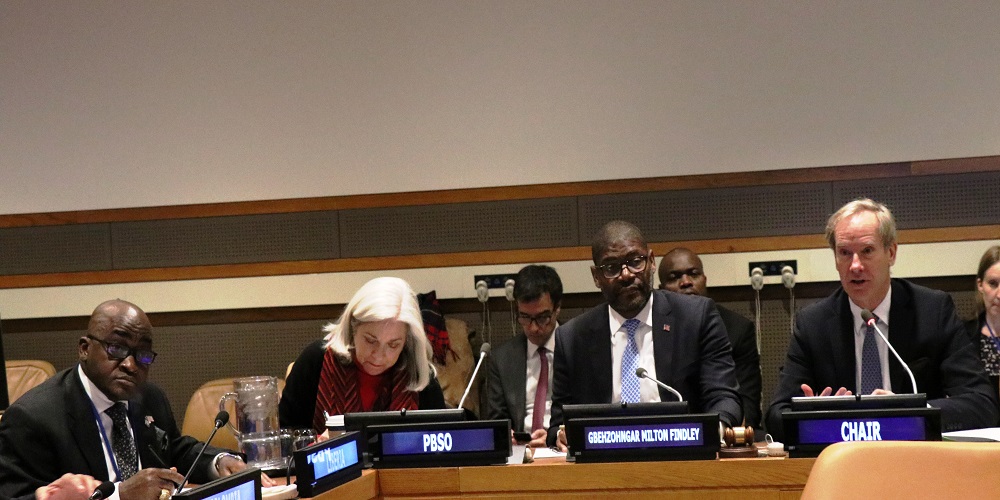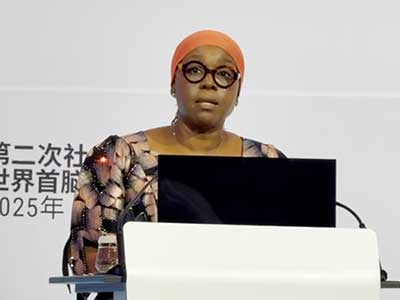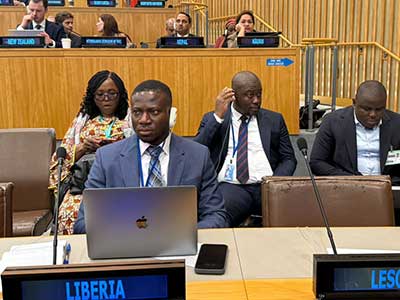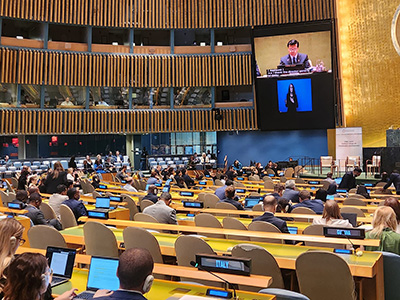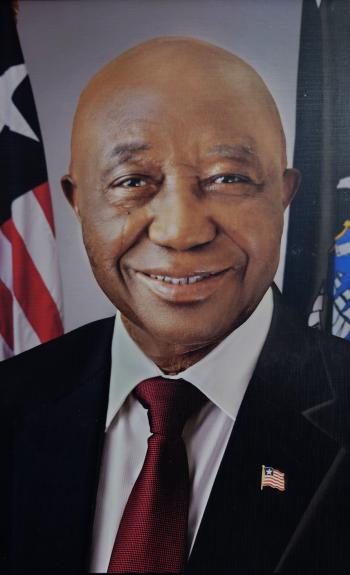The Government of the Republic of Liberia on Thursday, January 31, presented its Pro-Poor Agenda for Prosperity and Development at the United Nations Headquarters in New York.
Held under the auspices of the Liberia Configuration of the United Nations Peacebuilding Commission (PBC) at its Thirteenth(13th) Session, the well-attended presentation ceremony attracted scores of United Nations (UN) Member States, bilateral, sub-regional, regional and multilateral partners, and the Civil Society in New York and Liberia.
In his Opening Remarks, Liberia's Minister of Foreign Affairs, His Excellency Gbehzongar Milton Findley thanked the Chair of the Liberia Configuration of the PBC, His Excellency Ambassador Olof Skoog of Sweden, for convening such a critical and valuable Peacebuilding Commission meeting on Liberia, and providing the platform for the Government of Liberia to present its Pro-Poor Development Agenda at the United Nations Headquarters.
Minister Findley told the gathering that peacebuilding and the consolidation of peace, as well as economic development, were integral priorities of the Government of Liberia. He called on partners; including the United Nations, Regional and Sub-regional Organizations, Member States, International Partners, and philanthropists to support the Liberia Multi-Partner Trust Fund (LMPTF)-- the United Nations system’s principal financing mechanism for supporting programs designed to sustain peace in Liberia following the departure of the United Nation's Mission in Liberia (UNMIL).
Speaking further, Minister Findley explained that funds contributed through the LMPTF will be useful for security sector development; strengthening governance and the justice system; advancing national reconciliation, and the respect for human rights and dignity; among others.
According to a dispatch from the Permanent Mission of Liberia to the United Nations, Minister Findley expressed the hope that the PBC meeting on Liberia would attract the necessary and predictable funding to address the multiple challenges facing Liberia as the country strives to sustain the peace. " We are aware that preventing conflicts and building sustainable peace come with a considerable cost, and are faced with a multiplicity of challenges; particularly as natural and capital resources remain scarce. Nonetheless, we trust that following this meeting, which provides the necessary platform for the Government of Liberia to present its Pro-Poor Development Agenda at the United Nations, the Liberia Multi-Partner Trust Fund (LMPTF) will be further able to attract the necessary and predictable funding it needs; we strongly believe it is a significant tool in actualizing our Five-year Pro-poor Agenda for Prosperity and Development and an ideal approach to reinforcing stability and success in Liberia."
For the official presentation of the Pro-Poor Agenda for Prosperity and Development, the Minister of Finance and Development Planning, Honorable Samuel D. Tweah, Jr. joined the meeting through a Video Teleconference (VTC) from Monrovia, and explained the four (4) pillars of the agenda: Power to the People; The Economy and Jobs; Sustaining the Peace; and Governance and Transparency.
Under Pillar One (1), Minister Tweah explained that the goal of the Government was to transform the lives of Liberians by ensuring access to and delivery of basic needs such as quality and affordable health, quality education, and social protection; while Pillar Two (2) would focus on infrastructural development; such as road construction, electricity, and agriculture-- sectors that are major drivers to transform the economy and provide jobs. For Pillars Three (3) and Four (4), the Minister explained that they would focus on scaling up investment in the security sector, and reforming budget allocations and fighting corruption; respectively.
A dispatch from the Permanent Mission of Liberia to the United Nations quotes Minister Tweah as stressing that the Pro-Poor Agenda was focused on preventing waste and ensuring delivery and result through the optimization of resources.
Minister Tweah put the cost of financing the Pro-Poor Agenda at 6.2 Billion United States Dollars and emphasized that the Government of His Excellency President George Manneh Weah was committed and politically willing to implement the Pro-Poor Agenda, but needed the support of all Partners and Friends of Liberia to succeed.
Buttressing the Government's plea for support, the Resident Coordinator of the United Nations Office in Liberia, Mr. Yacoub El Hillo, cautioned that the fragility in Liberia was real, and requires more than a project-to-project support to consolidate the peace.
Mr. El Hillo emphasized that it was time to prioritize conflict prevention in Liberia by adequately funding the Liberia Multi-Partner Trust Fund (LMPTF) to strengthen the office of the Resident Coordinator, and enable the United Nations to work better in Liberia, and also provide needed resources for the implementation of the Pro-Poor Agenda.
At the same time, the Head of the United Nations Peacebuilding Support Office (PBSO), United Nations Assistant Secretary-General (ASG), Oscar Fernadez-Taranco said " lack of predictable, flexible, and catalytic funding" is a big challenge for any country in transitioning from peacekeeping to peacebuilding.
ASG Fernadez-Taranco said every aspect of the transition from peacekeeping to peacebuilding and peace sustenance in Liberia had been aligned; but the financing was missing. " The financing part is the crux of the issue; all other aspects have been aligned, but the missing link is financing. We have an enabling environment where the Sustainable Development Goals (SDGS) can be achieved; we have a committed and inclusive leadership; we have had a successful transition; we have a vibrant Resident Coordinator and Development Partners. The missing piece right now is financing." He emphasized.
ASG Fernadez-Taranco assured that the Peacebuilding Support Office will align its contributions with the priorities of the Government of Liberia's Pro-Poor Agenda, through the Liberia Multi-Partner Trust Fund (LMPTF). He urged all Member States of the United Nations to act similarly, and contribute to the (LMPTF); stressing that it would support the implementation of resolutions adopted in the United Nations Security Council and the United Nations General Assembly, demanding a more coherent management of Member States' contributions to peacebuilding globally.
Several UN Member States, regional and multilateral partners, including Canada, Japan, Germany, France, Ireland, Egypt, Morocco, United Kingdom, Colombia, the Economic Community of West African States (ECOWAS), the African Union, the European Union, and the World Bank, welcomed the Liberian Government's National Development plan--The Pro-Poor Agenda.
According to the dispatch from the Liberian Permanent Mission to the United Nations, the Partners and Friends of Liberia said they were impressed by the Government's efforts to sustain the peace despite multiple challenges; and pledged their support towards the implementation of the pillars of the Pro-Poor Agenda.
For his part, the Chair of the Liberia Configuration of the Peacebuilding Commission, His Excellency Ambassador Olof Skoog said the presentation of the Pro-Poor Agenda at the United Nations presented a clear understanding of the fragilities in Liberia, and provided partners a better understanding of what the Government's priorities are.
Ambassador Skoog stressed that moving on from years of peacekeeping to peacebuilding and peace sustenance, Liberia needed a transitional package with strong financial commitment from the International Community, partners and the United Nations System, to enable it to succeed.
Ambassador Skoog assured that the Peacebuilding Commission, as mandated by the United Nations, would continue to accompany Liberia on the journey to consolidate the peace, and address the remaining challenges of security and governance, while addressing the root causes of the civil conflict.
He hailed the expressions of goodwill from UN Member States and other partners, and encouraged them to translate the goodwill to concrete support bilaterally and through the LMPTF. " In order to be successful, there needs to be an accompaniment of all the goodwill, and much of that spells out as resources. There is a fixation to look at only what the United Nations is doing, that is important in itself and needs to be importantly stressed and supported; but I think colleagues all around this table here, you are members of this configuration because each and every one of you on the national basis is committed--we hope, to supporting Liberia. So the way we do that is to provide funds, and work as bilateral donors; as well as share experiences as we have seen from countries here today." Ambassador Skoog concluded.
Liberia's Ambassador Extraordinary and Plenipotentiary, and Permanent Representative to the United Nations, His Excellency Dee-Maxwell Saah Kemayah, Sr., who proposed the presentation of the Pro-Poor Agenda at the United Nations, on behalf of His Excellency President George Manneh Weah, thanked the United Nations System; especially the Peace Building Commission and all Partners and Friends of Liberia for their unflinching practical commitment and support towards Liberia's peacebuilding process.
Ambassador Kemayah, especially, hailed the Peacebuilding Commission for being the first to contribute to the Liberia Multi-Partner Trust Fund (LMPTF) when it was launched, noting that the PBC's support has positively impacted the areas of peacebuilding and reconciliation; as well as gender mainstreaming in the security sector. He emphasized that Liberia proudly hosts the largest gender-responsive Security Sector Reform (SSR) initiative currently supported by the United Nations.
The Liberian Diplomat assured the United Nations and partners that Liberians were prepared to translate the support of the Peacebuilding Fund into meaningful results; including the deepening of the Country's democracy.
Stressing the correlation between peace and sustainable development, Ambassador Kemayah reiterated calls for comprehensive support to the implementation of the Pro-Poor Agenda for Prosperity and Development, an agenda that incorporates goals of the United Nations 2030 Agenda. " We crave your support for Liberia’s Pro-Poor Agenda in every way humanly possible. Let today be the beginning of new things that are to happen in our great country. Let today be the renewal and actualization of your continued support to initiatives aimed at solidifying the peace and advancing development in Liberia; thereby sustaining the restoration of hope to the people of Liberia. We look forward to the United Nation’s promise in strengthening the Resident Coordinator’s Office; noting that this office is expected to work on building partnerships with political and civil society networks, and with relevant Ministries and Agencies of the Liberian Government, as well as the international community".
Ambassador Kemayah said it was time to showcase Liberia beyond the reference of a United Nations Peacekeeping success story, to being a nation with massive achievements-- post-conflict and post peacekeeping. Ambassador Kemayah: "We want to showcase the outcome of being a resilient nation – a nation that would be truly reconciled, and will erase every semblance of conflict… A nation fully prepared to dispense peace, and not a host of a peacekeeping operation…A nation whose rebirth will be an inspiration to many other nations. This is how we envisage the new Liberia under the leadership of His Excellency President Weah, and these are what the Pro-Poor Agenda is set to achieve."
Ambassador Kemayah explained that the Country was already making strides in addressing critical concerns aimed at spurring the needed reforms; such as the reduction and standardization of salaries for Ministers of the Liberian Government and Heads of Autonomous Agencies; the signing into law of the Land Rights Act and the Local Government Act, as a further means of addressing the root causes of conflict; the pavement of about twenty (20) community roads with asphalt; the declaration by His Excellency President Weah of tuition-free education for undergraduate students at all the public universities in Liberia; among others.
Ambassador Kemayah assured that the Government of His Excellency Dr. George Manneh Weah was also committed to signing into law, among several others, the Domestic Violence Act and the Kamara Abdullah Kamara Act of Press Freedom, which would protect people from crimes such as Criminal Libel against the President; Sedition and Criminal Malevolence.
Representatives of the World Bank, the Economic Community of West African States, the African Union in Liberia; the National Civil Society Council of Liberia, and the Ministry of Internal Affairs also addressed the very fruitful presentation forum of the Pro-Poor Agenda at the United Nations.

